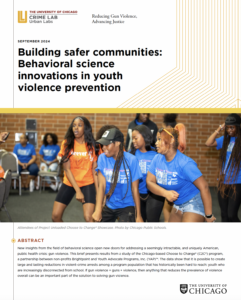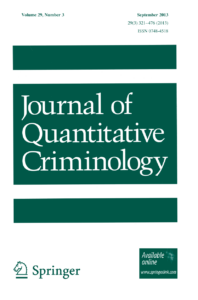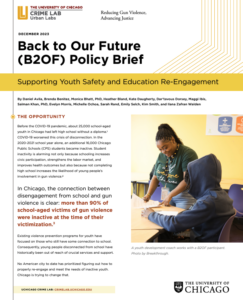Oct 2024
Unpacking the Impacts of a Youth Behavioral Health Intervention: Experimental Evidence from Chicago
This working paper details results from a study of Choose to Change® (C2C®), a trauma-informed cognitive behavioral therapy and intensive mentoring program developed by nonprofits Brightpoint and Youth Advocate Programs, Inc. (YAP).
Abstract
Racial disparities in violence exposure and criminal justice contact are a subject of growing policy and public concern. We conduct a large-scale, randomized controlled trial of a six-month behavioral health intervention combining intensive mentoring and group therapy designed to reduce criminal justice and violence involvement among Black and Latinx youth in Chicago. Over 24 months, youth offered the program experienced an 18 percent reduction in the probability of any arrest and a 23 percent reduction in the probability of a violent-crime arrest. These statistically significant impacts, with smaller magnitudes, continue to persist up to 3 years post randomization. To better understand the behavior change we observe given an arrest is a proxy for criminal behavior, we create a supervised machine learning algorithm from arrest narratives that determines if an arrest was initiated more or less at the discretion of police. We find that the program’s impacts are concentrated in arrests where officers have less discretion in initiating contact, while having little impact on more discretionary contact arrests (e.g. a young person exhibiting “suspicious” behavior). This analysis suggests the effects of the program are being driven by a reduction in youth offending behavior rather than by avoiding police contact.

Building safer communities: Behavioral science innovations in youth violence prevention
This policy brief highlights results from a large-scale randomized controlled trial that evaluated the impact of Choose to Change® (C2C®) on participants’ criminal justice involvement.

Choose to Change® (C2C®) Program Guide
This program guide is intended for community-based organizations working to fill gaps in services and reach an underserved population of youth impacted by violence and trauma.

Improving Programming in Juvenile Detention: The Impact of Project Safe Neighborhoods Youth Outreach Forums
This paper presents the results of a randomized controlled trial of a youth outreach forums program run in the Cook County Juvenile Detention Center (JTDC) by the Northern Illinois Project Safe Neighborhoods Task Force.

B2OF Policy Brief: Supporting Youth Safety and Education Re-Engagement
This policy brief outlines the first year of implementation of Back to Our Future (B2OF), a state-funded, district-led, evidence-informed effort to re-engage disconnected students at an elevated risk for gun violence involvement.
Latest Updates
Chicago’s Homicides Are Headed for Lowest Tally in 60 Years
Kim Smith, the Crime Lab’s Director of National Programs, speaks with Bloomberg’s Miranda Davis about the 2025 declines in violent crime in Chicago.

Chicago looks to close out 2025 with a 10-year low in violent crime
The Crime Lab’s experts and end-of-year analysis of Chicago crime trends are heavily featured in the latest Crain’s Forum on violence reduction.

The Best Books of 2025
The New Yorker includes Crime Lab Pritzker Director Jens Ludwig’s book, “Unforgiving Places: The Unexpected Origins of American Gun Violence,” on its annual list of best books of the year.

